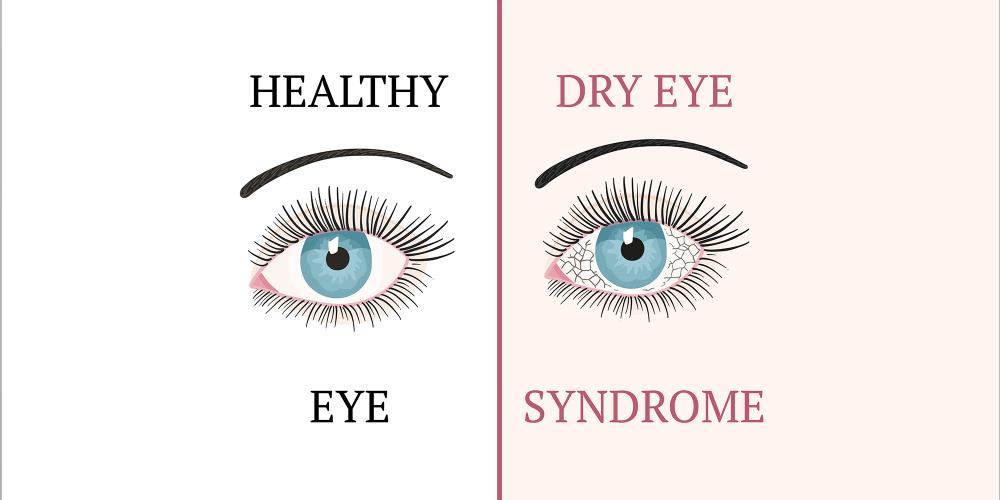
Sarah’s Health Notes: Get Dry Eyes Blinking Better
Dry Eye Syndrome is a common problem but the pandemic has significantly increased the number of sufferers, as we spend more hours locked to our screens
‘Do your eyes water excessively in the mornings when you wake up?’ asked the optician during a recent (long overdue) eye examination. Also, did I feel as if I often had something in my eye? A resounding ‘yes’ to both was my response. And then ‘yes’ and ‘yes’ again to the tick list of symptoms for dry eye syndrome (DES), medically called keratoconjunctivitis sicca.
The underlying cause of DES is problems with the tear film, which is spread across the surface of the eye every time we blink. If we don’t blink enough, the film evaporates and becomes dry; that causes a break in the film, which can make your vision blurred, and your eyes feel gritty and sore. Your eyes may also be sensitive to light and you may have a burning sensation. And contact lens wearers may become intolerant to those.
DES is a big problem for consumers, says Shabir Daya, the in house pharmacist at Victoria Health. ‘DES is very common in people aged over 40, particularly women,’ he says. It’s estimated that nearly 60% of women before, during and after menopause suffer from DES. ‘Lower hormone levels are believed to affect the eye structures and the composition of the tears you produce,’ according to Shabir Daya. (See below for Shabir’s product recommendations.)
The pandemic has exacerbated the problem because many workers are spending more time locked into our screens, according to Professor Stefano Barabino, head of the Ocular Surface Centre at the Sacco Hospital, Milan. A poll of 1109 people this spring, commissioned by eye care brand Rohto, revealed that 55% of participants stare at a screen for five to seven hours a day – in some cases much longer - with only seven in 100 taking the recommend hourly screen break.
‘Sitting in front of a screen, we simply do not blink enough,’ says Professor Barabino, writing in The Ophthalmologist last year. ‘Studies have shown the average number of blinks decreases from about 18 per minute in normal conditions to three or four per minute while watching a screen. Moreover, when we blink while screen watching, that blink is not as forceful or complete. This combination of reduced frequency and intensity of blinks during screen time increases the risk of inducing or exacerbating dry eye disease.’
So, what to do?
Have regular eye checks. The ophthalmic practitioners and optometrists, who work at an optician’s practise (too many job descriptions here!), don’t just check your sight – although that is vital, of course – they also examine your eyes for conditions including cataracts and glaucoma (and DES), and also all manner of health conditions including diabetes and high blood pressure, thyroid disease, some cancers and autoimmune disorders. The recommendation for people with healthy eyes is to have a check every two years. If you have a family condition such as glaucoma, go every year. Many people in the UK are eligible for free eye tests: details here.
Take regular screen breaks. One of the side effects of the pandemic, we’ve found, is that we’re working on our own rather than with others where we have breaks for a chat – water cooler moments. So, we have to set the alarm on our phone and make ourselves get up every hour. It’s good to drink a glass of water then, too.
Blink, blink, blink! There are lots of apps to get you blinking – I’m going to try Eyeblink, which offers a basic free programme with a simple reminder to blink every three seconds and also the option of paying for camera-based features to measure your blink rate (there’s a free 14-day trial first) and a blink reminder if your blink rate is below par.
Consider supplements. Shabir Daya recommends Tear Support with MaquiBright, a natural remedy to enhance tear production. The dose is one vegetarian capsule containing maqui berry in the morning to help support eye health for the whole day. He also suggests Pharma Nord Omega 7 Sea Buckthorn Oil. For more information on DES, read Shabir’s editorial – Symptoms of Dry Eyes.
DISCLAIMER: The views, opinions and information expressed in this article and on Victoriahealth.com Ltd are those of the author(s) in an editorial context. Victoriahealth.com Ltd cannot be held responsible for any errors or for any consequences arising from the use of the information contained in this editorial or anywhere else on the site. Every effort is made by the editorial and content team to see that no inaccurate or misleading information, opinion or statement appear, nor replace or constitute endorsement from medical bodies or trials unless specified. Victoriahealth.com Ltd accept no liability for the consequences of any inaccurate or misleading data, information, opinion or statement. Information on Victoriahealth.com Ltd and in the editorials is provided for informational purposes only and is not intended as a substitute for the advice provided by your physician or other healthcare professional. You should not use the information on this website or in the editorials for diagnosing or treating a health concern or disease, or for the replacement of prescription medication or other treatment.